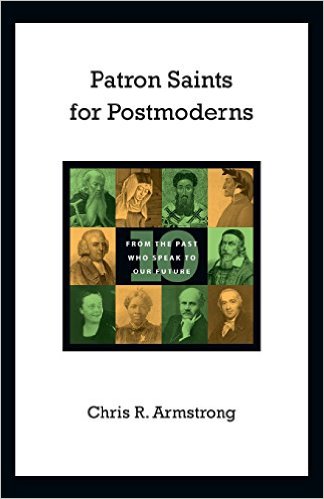Patron Saints for Postmoderns:
Ten from the Past Who Speak to our Future
by Chris R. Armstrong
Review by Teri Hyrkas
In times past, babies born into a Catholic family would, at their baptism, be christened with the name of a hero of the Catholic church. This godly hero, whose life was meant to serve as an example and encouragement to the child throughout his or her lifetime, was known as a patron saint. As the child grew up, godparents — special guests and witnesses to the infant’s baptism — were expected to share the story of the patron saint with their godchild as a means of guiding the youngster in faith. Chris R. Armstrong, author of Patron Saints for Postmoderns: Ten From the Past Who Speak to Our Future (InterVarsity Press, 2009) has, in a sense, taken on the role of a godparent by recording the stories of ten Christians whose lives speak wisdom to our postmodern age. Armstrong writes: “[The] people who fascinate me — the ones I think we most need to hear from today — are not the geniuses, the originators of systems of Christian thought. Rather they are the hard-nosed doers — the incarnators of the gospel. These are the people who became human object-lessons, living out a culturally powerful ‘translation’ of the Christ message.”
In Patron Saints for Postmoderns, Armstrong encourages today’s followers of Christ to draw on the stories of these flawed but committed believers when dealing with questions and difficulties of following Christ. These saints, says Armstrong, “…had been ‘wrestling prophets’ like Jacob, contending with God….They had spoken and taught and especially lived prophetically, as goads and thorns and object-lessons to the church in their own times and places….In order to translate the gospel for their own times, the people in this book also crossed and broke down barriers.”
Of the ten men and women who are profiled in the book, a few names are familiar: Dante Alighieri, John Newton and Dorothy Sayers. Others are less well known: Antony of Egypt, Gregory the Great, Margery Kempe, John Amos Comenius, Charles Simeon, Amanda Berry Smith and Charles M. Sheldon. Here are a few highlights about a lesser known saint, Charles Simeon:
Charles Simeon (1759 – 1836) was born in England into a wealthy and respected family, but the description included in Armstrong’s book about the young Simeon’s personality paints a picture of a very unlikable fellow: He was ” proud, imperious, fiery-tempered; a solitary individual, eager for friendship, whom others avoided because of his conceits, eccentricities and barbed words.” Armstrong tells us, “Those who knew him in his youth could hardly have guessed that in the course of his fifty-four years of ministry at Cambridge University and from the pulpit of Holy Trinity Church, Simeon would mentor some 30 percent of the Anglican ministers of his day, (1,100 or more), …send countless chaplains to India and help launch the hugely influential Church Missionary Society.” According to Armstrong, none of these accomplishments came easily due to bitter opponents in the Anglican church and Cambridge, and Simeon’s struggles with his own temper and temperament.
How does a strong willed, fiery person become an effective servant of God? Through a life-long campaign to learn humility. Armstrong writes that Simeon “continued to accept correction and discipline, not only from his Lord but also from his friends — people that got to see that Charles Simeon struggled with habits and issues that might have stopped another person from being useful to God.”
Armstrong writes in the closing paragraphs on Charles Simeon: “Simeon stands as an encouraging example of how God uses broken vessels to accomplish his work. For those of us…who want to serve God, yet also recognize the ugly forms that brokenness has taken in our hearts and lives, the story of a man such as Simeon can be a reviving thing.”
Patron Saints for Post Moderns also contains Armstrong’s thoughts on Dante Alighieri and the Divine Comedy — which writer Dorothy Sayers (1893-1957), who Armstrong includes in his list of saints, translated into English during the last years of her life. Armstrong and Sayers see the Divine Comedy as addressing three areas in today’s church: compassion paralysis, moral irresponsibility, and blame shifting. Sayers, in speaking to her era, also speaks to ours, admonishing the reader with these strong words: “… that good and evil exist, that the will is free to choose between them, that, consequently, the individual, even though in part conditioned by heredity and environment…nevertheless remains morally responsible; that damnation is self-willed; that under grace, repentance, contrition and reparation can liberate the soul to accept the forgiveness of God”
In his comments about the relevance of the Divine Comedy for life today Armstrong concludes: “[Dante] progressively becomes aware of how salvation is not individual but global and cosmic. Hell, purgatory and paradise are all social experiences. In all three, at every juncture, Dante the pilgrim interacts with people….In the Comedy, then, postmodern Christians can find a concern for souls and for social salvation together in one place, in a vision that is uncompromisingly theological.”
As a good “godparent,” Chris R. Armstrong has made available in Patron Saints for Postmoderns an excellent collection of stories that is both exemplary and inspiring. November first is All Saints Day. If you are looking for a book about “that great cloud of witnesses,” one that is a source of encouragement in your faith walk, Patron Saints for Postmoderns may be just the one for you.

